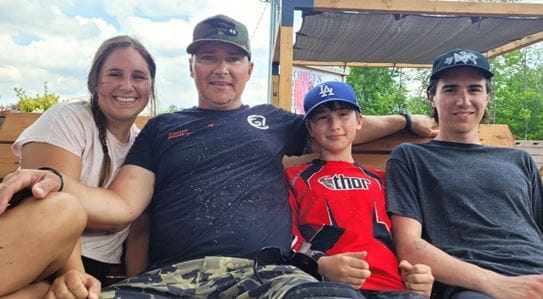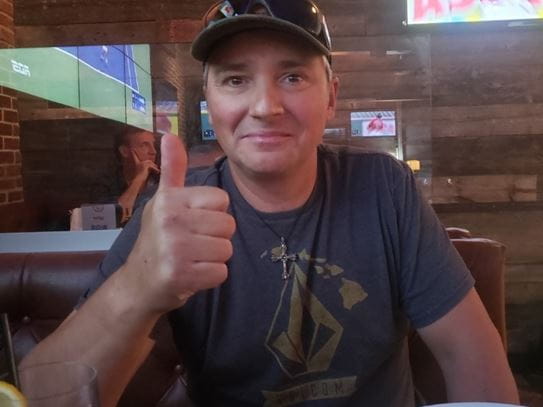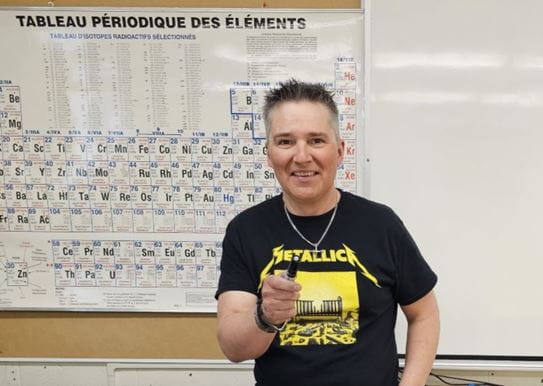In early 2017, Sébastien was teaching science at Paul-Hubert high school in Rimouski (Quebec). In those days, life was good: he was in love, his children were happily growing up and he loved his job.

His father had been diagnosed with prostate cancer at an advanced age. Given that he was much younger and wasn’t presenting any symptoms, Sébastien wasn’t worried, even though his bladder was showing signs of overactivity.
“I was only 47 years old. I thought I was too young to get cancer.”
Still, his partner at the time urged him to see his doctor to make sure everything was okay. After undergoing several tests, the diagnosis came back - cancer.
“That was the first massive blow.”
Sébastien was in shock, as were his loved ones. A bout of anxiety immediately set in, the first of several.
Finding an effective treatment
He underwent surgery at Hotel-Dieu Hospital in Quebec City. It went well, better than expected. Prior to surgery, the specialist told Sébastien that his prostate was so large that part of his intestine might have to be removed. The possibility of having an ostomy increased his anxiety.
“When I woke up, the first thing I did was to see if I had a colostomy bag.”
Fortunately, that wasn’t the case. His prostate removal surgery went as planned, but he was faced with a second setback shortly following that: his pathology results revealed the presence of cancer cells in his lymph nodes. For six months, he underwent six rounds of chemotherapy at a rate of one per month in addition to injections to block testosterone. The side effects were painful, but his life was at stake.
Although Sébastien was hopeful when he met with his doctor for a follow-up, the news was bad: the treatments weren’t working. His PSA (a protein made by prostate cells) and testosterone levels remained high.
To get answers to troubling questions, he turned to the Canadian Cancer Society’s Cancer Information Helpline, where he spoke to an information specialist. The specific answers he received helped calm Sébastien, who was able to better understand certain aspects of his illness, its treatments and their effects.
In late 2018, he was put on enzalutamide, a drug that prevents cancer cells from growing using testosterone, which made all the difference for Sébastien: “I won the lottery of life that day. My PSA levels dropped to zero and I haven't had any signs of metastatic disease since. I get chills when I talk about it.”
Adapting after treatment
Sébastien changed some of his habits to improve his quality of life. Among other things, he learned to respect the limits of his body.
“I used to run on a full tank, but now it’s the size of a small glass. If it gets too empty, it takes me days or even weeks to recover.”
His muscle mass has also been affected by his reduced energy levels and blocked testosterone. He has to exercise to stay in shape.
These changes also led to another painful event. He and his partner at the time “were no longer in the same place.” The end of his relationship was hard. When he was with his partner, his life seemed more manageable but once he was alone, he became depressed.

Being happy with a different life
After a seven-year sick leave, Sébastien returned to his teaching position this year at Mistral high school in Mont-Joli (Quebec). His colleagues welcomed him with open arms. Their compassion and empathy comforted him and made him feel at home.
Today, Sébastien is gradually finding his bearings as he strives to build a happy life. He takes care of himself and enjoys every moment spent with his kids.
“Priorities change. Material things don’t matter anymore. That's not what's important.”
Sébastien is well aware that an early diagnosis would have changed the course of his care and increased his long-term survival odds. That’s why he feels it’s so important to make men aware of prostate cancer.
I tell everyone I meet that every man should get a blood test at the age of 40. It's that simple.

